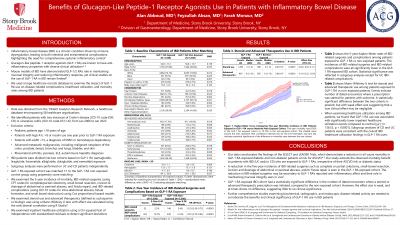Monday Poster Session
Category: IBD
P2601 - Benefits of Glucagon-Like Peptide-1 Agonists Use in Patients with Inflammatory Bowel Disease
Monday, October 28, 2024
10:30 AM - 4:00 PM ET
Location: Exhibit Hall E

Has Audio

Alan Abboud, MD
Stony Brook University Hospital
Ramsey, NJ
Presenting Author(s)
Alan Abboud, MD1, Feyzullah Aksan, MD2, Farah Monzur, MD3
1Stony Brook University Hospital, Ramsey, NJ; 2Renaissance School of Medicine, Stony Brook University, Port Jefferson Station, NY; 3Renaissance School of Medicine at Stony Brook University, Stony Brook, NY
Introduction: Glucagon-like peptide-1 (GLP-1) agonists are known to have anti-inflammatory properties with diverse clinical implications. Animal models of inflammatory bowel disease (IBD) have demonstrated GLP-1 agonists’ role in maintaining mucosal integrity and reducing inflammatory response, yet clinical studies remain limited. We examined the impact of GLP-1 agonists on disease-related complications and treatment utilization among IBD patients.
Methods: We performed a retrospective, observational, propensity-matched cohort study using data from the TriNetX Analytics Research Network. Patients 18 years of age and older with two instances of Crohn’s disease (ICD-10 code K50; CD) or ulcerative colitis (ICD-10 code K51; UC) from Jan 2006 to Jan 2022 were identified. IBD patients were divided into two cohorts based on GLP-1 agonists (ATC A10BJ) exposure. Patients with A1c > 8, insulin use, CKD-V, ESRD, hemodialysis dependence, advanced metastatic malignancies and other autoimmune conditions were excluded. The two cohorts were matched using a 1:1 propensity score. We compared the 5-year rates of mortality, IBD-related surgeries, and IBD-related complications using Cox regression. Steroid use, advanced therapeutics (cyclosporine or biologics) use, and healthcare utilization were compared using a t-test.
Results: Outcomes were analyzed in 5,508 propensity-score matched IBD patients with and without GLP-1 agonists exposure. IBD patients treated with GLP-1 agonists had lower 5-year mortality rates than patients without any prior GLP-1 agonists exposure (8.05% vs 10.03%, P < 0.0001; HR 0.65, 95% CI 0.54-0.78). IBD patients treated with GLP-1 agonists also had a decreased risk in IBD-related surgeries and IBD-related complications (HR 0.53, 95% CI 0.39-0.72; HR 0.81, 95% CI 0.70-0.93, respectively). IBD patients with GLP-1 agonists exposure had fewer days of steroid use (t = -4.07, P < 0.0001) and fewer healthcare utilization events (t = -8.13, P < 0.0001) when compared to IBD patients without any GLP-1 agonists exposure. There was no difference in advanced therapeutic use between the two cohorts. Subgroup analyses of UC and CD patients separately yielded similar trends for the listed outcomes.
Discussion: Exposure to GLP-1 agonists in IBD patients correlates with lower rates of disease-related complications, surgeries, healthcare utilization and mortality. Further comprehensive clinical trials are needed to corroborate the benefits of GLP-1 agonists use in IBD patients.
Disclosures:
Alan Abboud, MD1, Feyzullah Aksan, MD2, Farah Monzur, MD3. P2601 - Benefits of Glucagon-Like Peptide-1 Agonists Use in Patients with Inflammatory Bowel Disease, ACG 2024 Annual Scientific Meeting Abstracts. Philadelphia, PA: American College of Gastroenterology.
1Stony Brook University Hospital, Ramsey, NJ; 2Renaissance School of Medicine, Stony Brook University, Port Jefferson Station, NY; 3Renaissance School of Medicine at Stony Brook University, Stony Brook, NY
Introduction: Glucagon-like peptide-1 (GLP-1) agonists are known to have anti-inflammatory properties with diverse clinical implications. Animal models of inflammatory bowel disease (IBD) have demonstrated GLP-1 agonists’ role in maintaining mucosal integrity and reducing inflammatory response, yet clinical studies remain limited. We examined the impact of GLP-1 agonists on disease-related complications and treatment utilization among IBD patients.
Methods: We performed a retrospective, observational, propensity-matched cohort study using data from the TriNetX Analytics Research Network. Patients 18 years of age and older with two instances of Crohn’s disease (ICD-10 code K50; CD) or ulcerative colitis (ICD-10 code K51; UC) from Jan 2006 to Jan 2022 were identified. IBD patients were divided into two cohorts based on GLP-1 agonists (ATC A10BJ) exposure. Patients with A1c > 8, insulin use, CKD-V, ESRD, hemodialysis dependence, advanced metastatic malignancies and other autoimmune conditions were excluded. The two cohorts were matched using a 1:1 propensity score. We compared the 5-year rates of mortality, IBD-related surgeries, and IBD-related complications using Cox regression. Steroid use, advanced therapeutics (cyclosporine or biologics) use, and healthcare utilization were compared using a t-test.
Results: Outcomes were analyzed in 5,508 propensity-score matched IBD patients with and without GLP-1 agonists exposure. IBD patients treated with GLP-1 agonists had lower 5-year mortality rates than patients without any prior GLP-1 agonists exposure (8.05% vs 10.03%, P < 0.0001; HR 0.65, 95% CI 0.54-0.78). IBD patients treated with GLP-1 agonists also had a decreased risk in IBD-related surgeries and IBD-related complications (HR 0.53, 95% CI 0.39-0.72; HR 0.81, 95% CI 0.70-0.93, respectively). IBD patients with GLP-1 agonists exposure had fewer days of steroid use (t = -4.07, P < 0.0001) and fewer healthcare utilization events (t = -8.13, P < 0.0001) when compared to IBD patients without any GLP-1 agonists exposure. There was no difference in advanced therapeutic use between the two cohorts. Subgroup analyses of UC and CD patients separately yielded similar trends for the listed outcomes.
Discussion: Exposure to GLP-1 agonists in IBD patients correlates with lower rates of disease-related complications, surgeries, healthcare utilization and mortality. Further comprehensive clinical trials are needed to corroborate the benefits of GLP-1 agonists use in IBD patients.
Disclosures:
Alan Abboud indicated no relevant financial relationships.
Feyzullah Aksan indicated no relevant financial relationships.
Farah Monzur: Gather-Ed – Consultant. Medtronic – Consultant. Prometheus – Consultant.
Alan Abboud, MD1, Feyzullah Aksan, MD2, Farah Monzur, MD3. P2601 - Benefits of Glucagon-Like Peptide-1 Agonists Use in Patients with Inflammatory Bowel Disease, ACG 2024 Annual Scientific Meeting Abstracts. Philadelphia, PA: American College of Gastroenterology.
